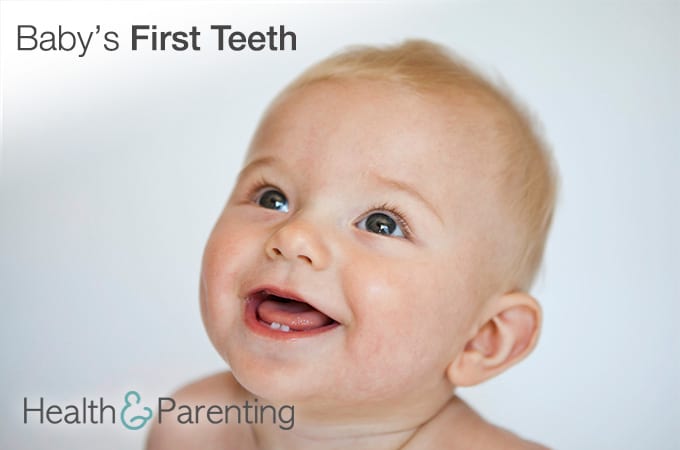Teething is an anticipated milestone. Although it can vary, teething typically starts about six months. But every baby’s teething timeline is different. Anywhere between three and 12 months is considered normal. It’s also important to understand, teething symptoms can start several weeks before the appearance of a tooth.
The sight of your baby’s first tooth popping through is adorable. What’s not so exciting is the teething symptoms she may experience. Although some babies sail through teething without much fuss, others may have a few bumps along the way.
Recognizing teething symptoms can help you ease your baby’s discomfort. For example, babies who are teething often gnaw on whatever they can find. The pressure from your baby’s tooth cutting through the gum is painful. He baby may bite on anything he can find to apply counterpressure to the gum, which can decrease discomfort.
Offering your baby a teething toy may help since it can provide counterpressure that may decrease pain. Cool teething toys often work best. Consider placing a teething toy in the refrigerator for a bit before you give it to your baby.
Another common sign of teething is drooling. All babies drool a bit. But if the floodgates have opened, and your little one is always soggy, teething may be the cause. It may be helpful to put a bib on your baby to keep clothes dry and wipe his chin often to prevent chapping.
You also might find your smiling bundle has become a lot fussier at times. His little mouth is hurting, and that’s no fun. So it’s no wonder he is not feeling his happy self. Teething may also spell trouble for getting a good night’s sleep for both of you. Don’t be surprised if your baby is crying and waking up more at night due to the discomfort.
Cranky babies with sore gums may also not eat as well. If your baby is eating solids, the pressure from the spoon may irritate his gums. Babies who are nursing or bottle feeding may pull away since the sucking can put pressure on the gums, which are already inflamed. Cold foods, such as chilled applesauce and yogurt may sooth your baby’s irritated gums and be a good choice.
Some babies also develop a fever when teething. Studies indicate that fevers from teething tend to be lower than 101 degrees Fahrenheit or 38.3 degrees Celsius. If your baby has a fever higher than that, it is more commonly due to illness.
If nothing seems to help your baby’s teething discomfort, baby acetaminophen may do the trick to reduce pain. But always check with your pediatrician first before giving your baby any medication.
Lastly, your baby also needs some extra snuggles and a little patience. On the tough days remember, teething won’t last forever. Pretty soon that gummy little grin will be a pearly white smile.
Written by MaryAnn DePietro @ writerlady34
This information is not intended to replace the advice of a trained medical doctor. Health & Parenting Ltd disclaims any liability for the decisions you make based on this information, which is provided to you on a general information basis only and not as a substitute for personalized medical advice. All contents copyright © Health & Parenting Ltd 2016. All rights reserved.










